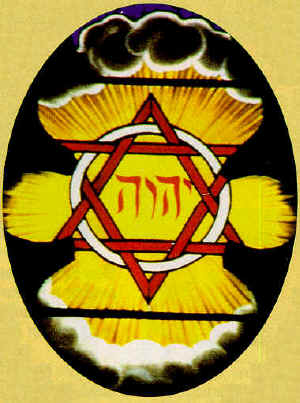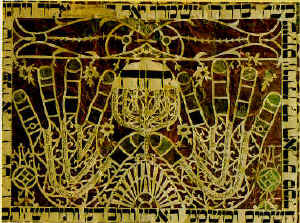The Torah: The Name of God
When God called to Moses out of the burning bush, telling him to free the Israelites from bondage in Egypt, Moses asked, “Suppose I go to the Israelites and say to then, ‘The God of your fathers has sent me to you,’ and they ask me, ‘What is his name?’ Then what shall I tell them?” (Exodus 3:13). God answered Moses, “I AM WHO I AM” (verse 14). The Hebrew word for “I AM” is ‘ehyeh, which comes from the verb “to be.” It can also be translated as “I SHALL BE.”
 |
| The Hebrew letters for God’s name, YHWH (read from right to left), are framed by the star of David in a stained-glass window in Winchester Cathedral, England (above). YHWH, shown above a menorah (below), appears between hands extended in blessing in a 19th-century papercut from Morocco. |
 |
God further told Moses: “Say to the Israelites, ‘The LORD, the God of your fathers…has sent me to you’” (verse 15). Although the Hebrew word for “Lord” is ‘adon, the word translated “LORD” in verse 15 is different. Spelled with the four Hebrew consonants YHWH, it is known as the tetragrammaton (Greek for “four letters”). YHWH is related to ‘ehyeh and also comes from the verb “to be.” Both words have the sense of “being actively present.”
Although most scholars pronounce the tetragrammaton as Yahweh, the correct pronunciation is not known for certain. The Hebrews avoided saying the tetragrammaton because they believed that saying the personal name of God could take God’s name in vain. When reading a passage of the Hebrew Bible that contained it, they referred to God by another word —’adonai or “my Lord.”
The oldest known manuscript fragments of the Septuagint (the ancient Greek translation of the Old Testament) leave the tetragrammaton untranslated. However, later manuscripts, probably reflecting Christian editing, render the tetragrammaton as kyrios, Greek for “Lord.” Later, English versions rendered the personal name YHWH as the impersonal “the LORD.” They used all capital letters for “LORD” to indicate they were translating YHWH, not ‘adon or ’adonai.
The text of the Hebrew Bible originally consisted of consonants only. When vowel marks were added in the 10th century A.D., the vowel marks of ‘adonai were used for the tetragrammaton to remind the reader to say ‘adonai instead of trying to pronounce the divine name.
When Latin translators in the 16th century came upon this combination, they transliterated, using the consonants of YHWH and the vowels of ‘adonai, creating the artificial form Iohoua. In 1530, Tyndale rendered the tetragrammaton as Iehouah in his Old English translation of Exodus 6:3. (As with many other words in that era, I was used for J, and U for V.) Subsequently, Jehovah became the standard spelling, and this appears at a few places in the King James Version (in Psalm 83:18, for example). However, in the vast majority of cases, the King James Version translates YHWH as “the LORD” and ‘adonai as “the Lord.”

